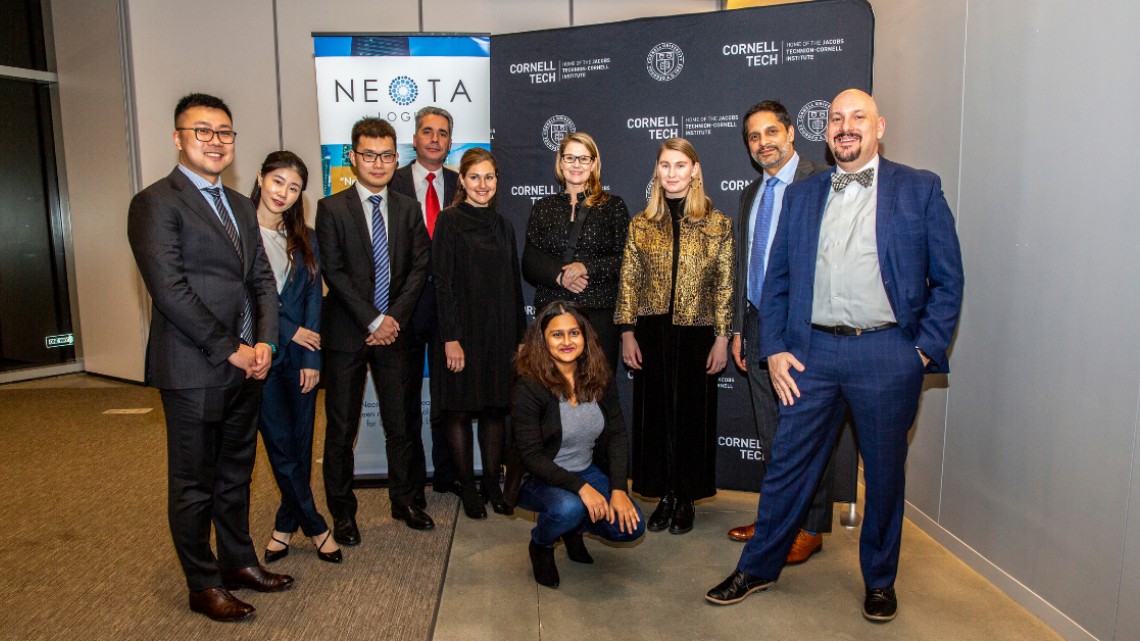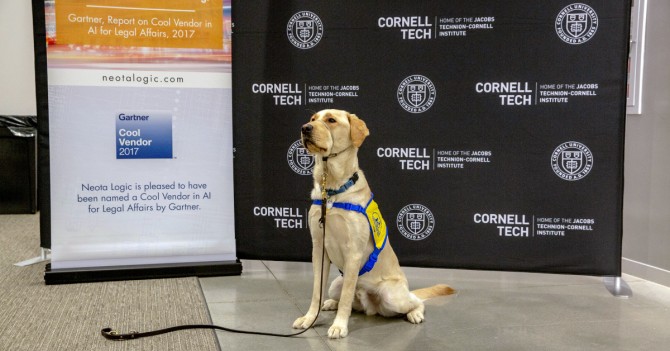
Students in the new Delivering Legal Services Through Technology class at Cornell Tech with the judges at their final presentation. The judges were Joe Breda, president of Bloomberg Law, right; Cornell Law School Dean Eduardo Peñalver, second from right; and Meredith Williams-Range, chief knowledge and client value officer at Shearman & Sterling, center.
Law, business students develop AI apps to aid nonprofits
By Melanie Lefkowitz
Service animals are essential to the people who need them, but their owners constantly encounter questions and suspicions, and are frequently denied entry to places they’re allowed by law.
An app created by students in the first Delivering Legal Services Through Technology class, open to LL.M., J.D. and MBA students at Cornell Tech, aims to quickly answer those questions and smooth those interactions. Developed for the nonprofit Canine Companions for Independence using software from the legal technology company Neota Logic, the project won best overall app at the class’ final presentation, held Dec. 3 at the Cornell Tech Tata Innovation Center.
“We wanted to create tailored, instant guidance, digestible education, awareness, but most importantly, peace of mind,” said Lizzie Christmas, LL.M. ’19, who with Marisha Thakker, LL.M. ’19 and Manuel Gonzalez Farfan, MBA ’19, designed an app that can be used via smart phone, has accessible features and offers a downloadable report as well as links to documentation animal owners may need.
A second group of students created a screening tool for Legal Assistance of Western New York, to help people who might need personal bankruptcy protection; it won the award for best user experience. A third group won best presentation for its app to help Pine Tree Legal Assistance with its intake process for fair housing claims.
“It’s satisfying and a source of pride to me to see Cornell Law School at the forefront in solving [the] challenge of access to justice,” said Eduardo Peñalver ’94, the Allan R. Tessler Dean of Cornell Law School and one of three judges at the event. “It’s doubly satisfying to see us at the cutting edge in teaching our students to interact with legal technology and formulating those solutions.”
The new class, which combined hands-on technical training with a speaker series featuring leaders in developing legal technology, sought to provide students with both the broader context and the technological know-how they’ll need in an evolving field, said Matthew D’Amore, Cornell Tech associate dean and professor of practice.
“Having an understanding and awareness of how technology is changing the legal profession, and how to use and stay on top of that technology, is going to be really critical for our students in their careers,” D’Amore said. “This class fits very well within the mission of what we’re doing here at Cornell Tech – looking for ways to use new technology to solve social problems, but also teaching our students about the effect these emerging technologies will have on the practice of law.”
Experts say the vast majority of Americans who need legal advice don’t hire lawyers because of the cost. Technology can both improve access to justice for people who can’t afford it and allow lawyers to work more efficiently, said Scott Rechtschaffen, J.D. ’84, chief knowledge officer at the law firm Littler Mendelson and one of the course’s three instructors.
“Most currently practicing lawyers read articles about AI and data analytics and think, ‘This is coming to replace me, the robotic lawyers are on the way.’ We really wanted to show students that technology is something to be leveraged – it’s not going to replace lawyers,” Rechtschaffen said. “Traditionally, law students went to law school, learned how to read the law, analyze the law, and write a brief or a memo. Now students should be learning the law, analyzing the law and developing legal applications.”
Students said they appreciated learning how to use the new tools and designing products that can help people in need.
“It was so interesting to learn what the legal technology can do,” said Dana Leshem, LL.M. ’19. “The app we had to build was a very complicated one, and we had to do many calculations and use formulas, but it was really fun. I didn’t imagine I would enjoy it so much.”
Max Paterson, LL.M. ’17, Neota’s vice president of education and community programs, co-taught the class with Rechtschaffen and Kevin Mulcahy. Paterson taught the students to use Neota’s software, which is customizable and doesn’t require coding skills.
“The students were really engaged,” said Paterson, who was part of Cornell Tech’s inaugural LL.M. class. “Everyone really had a commitment to what we were doing, or was open-minded to understanding this new field and concepts. It’s just the nature of this school – they’re open to new ideas, including the changing nature of what it means to practice law.”
Media Contact
Get Cornell news delivered right to your inbox.
Subscribe

